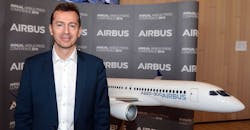Airbus CEO Warns of ‘Lose-Lose Game’ in Trade War Over Jetliners
An escalating battle over aircraft subsidies between the U.S. and the European Union threatens to damage both sides, said Airbus SE Chief Executive Officer Guillaume Faury.
“A trade war on aviation would be a lose-lose game because the supply chains are very integrated,” Faury told reporters Thursday at a briefing in Montreal. “We buy a lot in the U.S., we sell in the U.S. and we are a U.S. player as well.”
Airbus is at the center of the feud, with the World Trade Organization poised to authorize the U.S. to impose tariffs on almost $8 billion of European goods due to illegal state aid provided to the planemaker. The U.S. duties, which could hit as soon as October, will target jetliners and aircraft parts as well as luxury products such as wine and leather goods, according to the U.S. Trade Representative’s office.
An Airbus factory in Mobile, Alabama, depends on imported components to build the company’s top-selling A320 family jets, which are also made in Europe and China. Airbus plans to expand the U.S. site to build the smaller A220 as orders increase from customers such as Delta Air Lines Inc. and JetBlue Airways Corp.
Airlines for America, a trade group representing U.S. carriers, said tariffs on jetliners and aircraft parts would hurt the aviation industry and the broader economy. Faury echoed that view, saying the imposition of tariffs “will increase prices, it will have an impact on the cost of travel.”
Airbus says it sources about 40% of plane parts from the U.S. across its model range and regardless of where aircraft are assembled. That makes it the single biggest customer for the American aerospace industry and helps support 275,000 jobs across 40 states, according to the company.
The planemaker’s purchases from U.S. manufacturers will help keep down its exposure to the looming tariffs, as may moves to attract more suppliers to the Mobile area.
At the same time, jets produced at the site are constructed from large sub-assemblies sent by ship from Europe, with the A320’s fuselage coming from France and Germany, its wings from Britain and the tail from Spain. That means simply boosting output in Alabama won’t provide much of a workaround.
In a separate WTO case, the EU claimed that Boeing benefited from illegal subsidies, including from the state of Washington. That case is likely to conclude next year.
Faury said Airbus would continued to push for a negotiated settlement between the U.S. and the EU.
“We think it’s still possible,” he said.
About the Author
Bloomberg
Licensed content from Bloomberg, copyright 2016.
